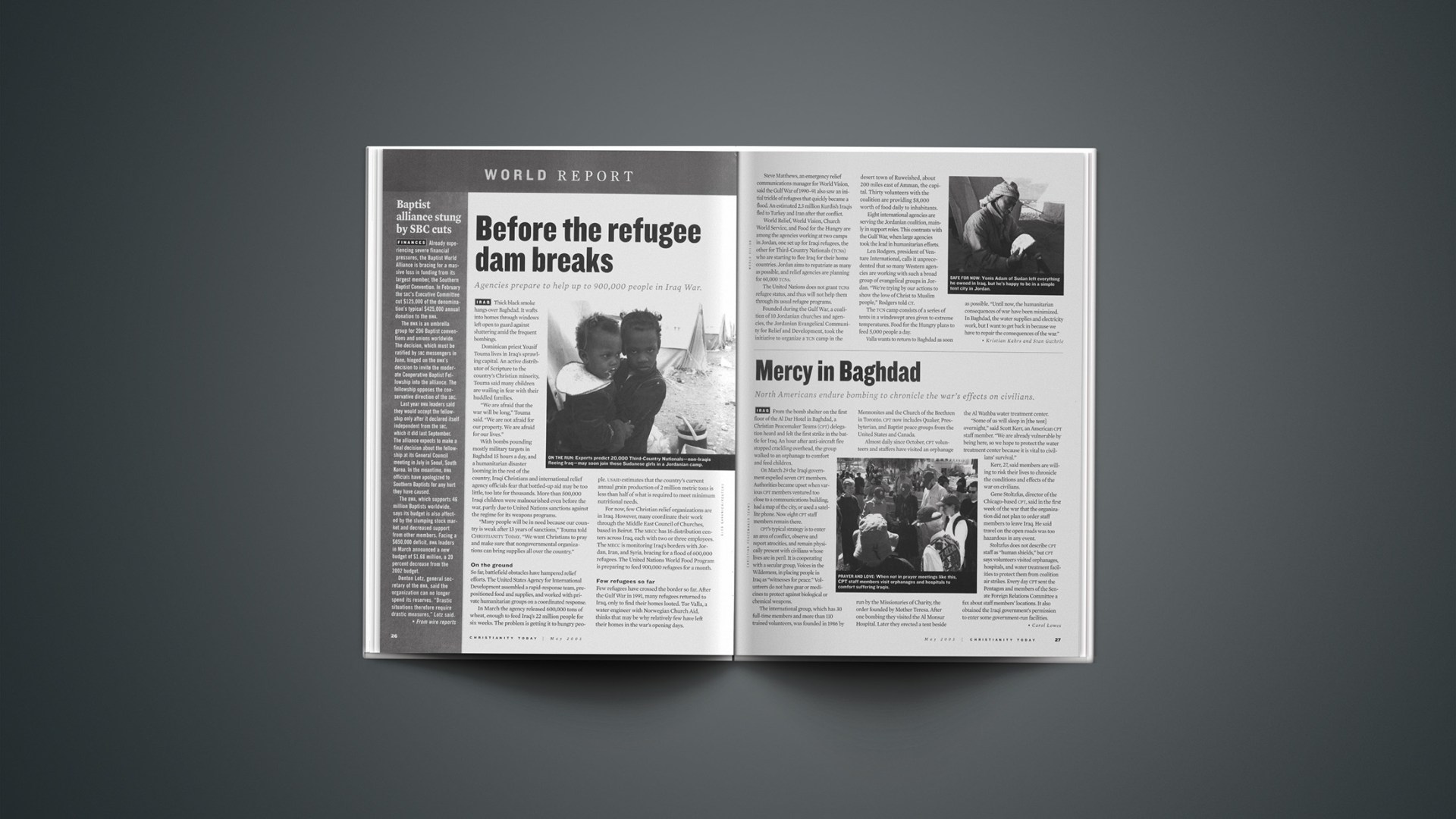From the bomb shelter on the first floor of the Al Dar Hotel in Baghdad, a Christian Peacemaker Teams (CPT) delegation heard and felt the first strike in the battle for Iraq. An hour after anti-aircraft fire stopped crackling overhead, the group walked to an orphanage to comfort and feed children.
On March 29 the Iraqi government expelled seven CPT members. Authorities became upset when various CPT members ventured too close to a communications building, had a map of the city, or used a satellite phone. Now eight CPT staff members remain there.
CPT’s typical strategy is to enter an area of conflict, observe and report atrocities, and remain physically present with civilians whose lives are in peril. It is cooperating with a secular group, Voices in the Wilderness, in placing people in Iraq as “witnesses for peace.” Volunteers do not have gear or medicines to protect against biological or chemical weapons.
The international group, which has 30 full-time members and more than 110 trained volunteers, was founded in 1986 by Mennonites and the Church of the Brethren in Toronto. CPT now includes Quaker, Presbyterian, and Baptist peace groups from the United States and Canada.
Almost daily since October, CPT volunteers and staffers have visited an orphanage run by the Missionaries of Charity, the order founded by Mother Teresa. After one bombing they visited the Al Monsur Hospital. Later they erected a tent beside the Al Wathba water treatment center.
“Some of us will sleep in [the tent] overnight,” said Scott Kerr, an American CPT staff member. “We are already vulnerable by being here, so we hope to protect the water treatment center because it is vital to civilians’ survival.”
Kerr, 27, said members are willing to risk their lives to chronicle the conditions and effects of the war on civilians.
Gene Stoltzfus, director of the Chicago-based CPT, said in the first week of the war that the organization did not plan to order staff members to leave Iraq. He said travel on the open roads was too hazardous in any event.
Stoltzfus does not describe CPT staff as “human shields,” but CPT says volunteers visited orphanages, hospitals, and water treatment facilities to protect them from coalition air strikes. Every day CPT sent the Pentagon and members of the Senate Foreign Relations Committee a fax about staff members’ locations. It also obtained the Iraqi government’s permission to enter some government-run facilities.
Copyright © 2003 Christianity Today. Click for reprint information.
Related Elsewhere:
For more coverage on the Iraq conflict, commentary and thought on just war, or Christian debate, see our CTWar in Iraq archive. For relevant articles on the war from news agencies around the globe, see CT’s updated war links page.
A downloadable Bible study on the implications of war with Iraq is available at CurrentIssuesBibleStudy.com. These unique Bible studies use articles from current issues of Christianity Today to prompt thought-provoking discussions in adult Sunday school classes or small groups.
Previous CT articles on Christian Peacemaker Teams include:
Peacemakers Seek to Show War from Point of View of Iraqi Civilians | Six Christian Peacemaker Team members remain in Iraq as bombs drop. (March 21, 2003)
Standing for Peace on the Eve of War | Christian group seeks nonviolent solution in Iraq. (March 12, 2003)
Risking Life for Peace | Caught between rebels, paramilitaries, and crop-dusters, peacemaking Christians put their lives on the line in violent Colombia. (September 7, 2001)
Hebron’s Peacemakers Find No Shalom in Olive Branches | Christian Peacemaker Teams, a social-justice group working overseas, is testing the boundaries of nonviolent intervention in its mission to Hebron. (Sept. 16, 1996)
Previous CT articles on Iraqi civilians:
Relief Agencies Prepare to Help Iraqi Refugees | Meanwhile Christians in Baghdad fear the worst. (March 26, 2003)
Keeping Their Heads Down | Vital but dwindling Christians face many pressures. (Nov. 8, 2002)










